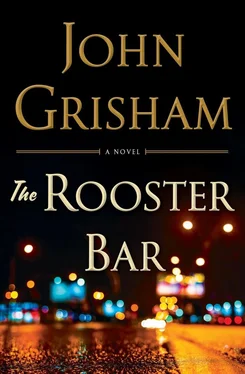But the energy simply wasn’t there, especially in the cold, dreary, depressing days of winter. At times the debt felt like cinder blocks strapped to his back. Walking was a chore. Smiling was difficult. He was living in poverty and his future, even with the job, was bleak. And he was one of the fortunate ones. Most of his classmates had the loans but not the jobs. Looking back, he’d heard the grumbling even in his first year, and with each semester the mood at school grew darker, the suspicions heavier. The job market worsened. The bar exam results embarrassed everyone at FBLS. The loans piled up. Now, in his third and last year, it was not unusual to hear students verbally spar with professors in class. The dean wouldn’t come out of his office. Bloggers blistered the school and screamed harsh questions: “Is this a hoax?” “Have we been had?” “Where did all the money go?”
To varying degrees, almost everyone Mark knew believed that (1) FBLS was a subpar law school that (2) made too many promises, and (3) charged too much money, and (4) encouraged too much debt while (5) admitting a lot of mediocre students who really had no business in law school, and (6) were either not properly prepared for the bar exam or (7) too dumb to pass it.
There were rumors that applications to FBLS had fallen by 50 percent. With no state support, and no endowment, such a decline would lead to all manner of painful cost cutting, and a bad law school would only get worse. This was fine with Mark Frazier and his friends. They would endure the next four months and happily leave the place, never to return.
Mark lived in a five-story apartment building that was eighty years old and visibly deteriorating, but the rent was low and this attracted students from George Washington and FBLS. In its earlier days it had been known as the Cooper House, but after three decades of frat-like wear and tear it had earned its nickname as the Coop. Because its elevators seldom worked, Mark took the stairs to the third floor and entered his cramped and sparsely furnished flat, for which he paid $800 a month for five hundred square feet. For some reason he’d cleaned the place after his last exam before the holidays, and as he flipped on lights he was pleased to see that everything was in order. And why shouldn’t it be? The slumlord who owned the place never came around. He unloaded his bags and was struck by the silence. Normally, with a bunch of students, and with thin walls, there was always a racket. Stereos, televisions, arguments, pranks, poker games, fights, guitar playing, even a trombone played by a nerd on the fourth floor that could rattle the entire building. But not today. Everyone was still at home, enjoying the break, and the halls were eerily quiet.
After half an hour, Mark was bored and left the building. Walking along New Hampshire Avenue, with the wind cutting through his thin fleece and old khakis, he decided, for some reason, to turn onto Twenty-First and stop by the law school to see if it was open. In a city with no shortage of hideous modern buildings, FBLS managed to stand out in its unsightliness. It was a postwar edifice covered with bland yellow bricks on eight levels slung together in asymmetrical wings, some failed architect’s effort at making a statement. Supposedly, it once was an office building, but walls had been knocked out with abandon to create cramped lecture halls on the four lower floors. On the fifth was the library, a rabbits’ warren of large, retrofitted rooms packed with seldom-touched books and some replicated portraits of unknown judges and legal scholars. The faculty had offices on the sixth and seventh floors, and on the eighth, and as far away from the students as possible, the administration carried on, with the dean solidly hidden in a corner office from which he seldom ventured.
The front door was unlocked and Mark entered the empty lobby. While he appreciated its warmth, he found the area, as always, utterly depressing. A huge bulletin board covered one wall with all manner of notices and announcements and enticements. There were a few slick posters advertising opportunities to study abroad, and the usual assortment of handmade ads offering stuff for sale — books, bikes, tickets, course outlines, tutors by the hour — and apartments for rent. The bar exam loomed over the entire school like a dark cloud and there were posters extolling the excellence of some review courses. If he searched hard enough he could possibly find a few employment opportunities, but at FBLS those had become scarcer by the year. In one corner he saw the same old brochures hawking even more student loans. At the far end of the lobby there were vending machines and a small coffee bar, but nothing was being brewed during the break.
He fell into a battered leather chair and soaked in the gloominess of his school. Was it really a school or was it just another diploma mill? The answer was becoming clear. For the thousandth time he wished he had never walked through the front doors as an unsuspecting first-year student. Now, almost three years later, he was burdened by loans he couldn’t imagine paying off. If there was a light at the end of the tunnel, he couldn’t see it.
And why would anyone name a school Foggy Bottom? As if the law school experience itself wasn’t dreary enough, some bright soul had, some twenty years earlier, tagged it with a name that conveyed even more cheerlessness. That guy, now dead, had sold the school to some Wall Street investors who owned a string of law schools that were reportedly producing handsome profits while cranking out little in the way of legal talent.
How do you buy and sell law schools? It was still a mystery.
Mark heard voices and hurriedly left the building. He hiked down New Hampshire to Dupont Circle, where he ducked into Kramer Books for a coffee and a quick thaw. He walked everywhere. His Bronco lurched and stalled too much in city traffic, and he kept it tucked away in a lot behind the Coop, always with the key in the ignition. Unfortunately, so far no one had been tempted to steal it.
Warm again, he hustled six blocks north along Connecticut Avenue. The law firm of Ness Skelton occupied a few floors in a modern building near the Hinckley Hilton. The previous summer Mark had managed to weasel his way inside when he accepted an internship that paid less than minimum wage. At major law firms, the summer programs were used to entice top students to the big life. Little work was expected. The interns were given ridiculously easy schedules, along with tickets to ball games and invitations to fine parties in the splendid backyards of the wealthy partners. Once seduced, they signed on, and upon graduation were soon thrown into the meat grinder of hundred-hour weeks.
Not so at Ness Skelton. With only fifty lawyers, it was far from a top-ten firm. Its clients were trade associations — Soybean Forum, Retired Postal Workers, Beef and Lamb Council, National Asphalt Contractors, Disabled Railroad Engineers — and several defense contractors desperate for their share of the pork. The firm’s expertise, if it had any, was maintaining relationships with Congress. Its summer intern program was designed more to exploit cheap labor than to attract top students. Mark had worked hard and suffered through the stultifying work. At the end of the summer, when he had received an offer that somewhat resembled a position upon passing the bar exam, he couldn’t decide if he should celebrate or cry. Nonetheless, he jumped at what was being offered — there was nothing else on the table — and proudly became one of the few FBLS students with a future. Throughout the fall, he had gently pressed his supervisor about the terms of his upcoming employment but got nowhere. There might be a merger in the works. There might be a split. There might be a lot of things, but an employment contract was not one of them.
Читать дальше












